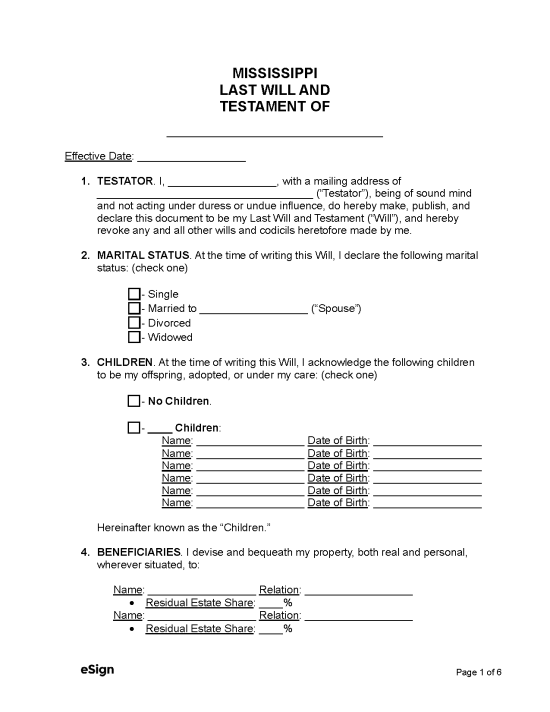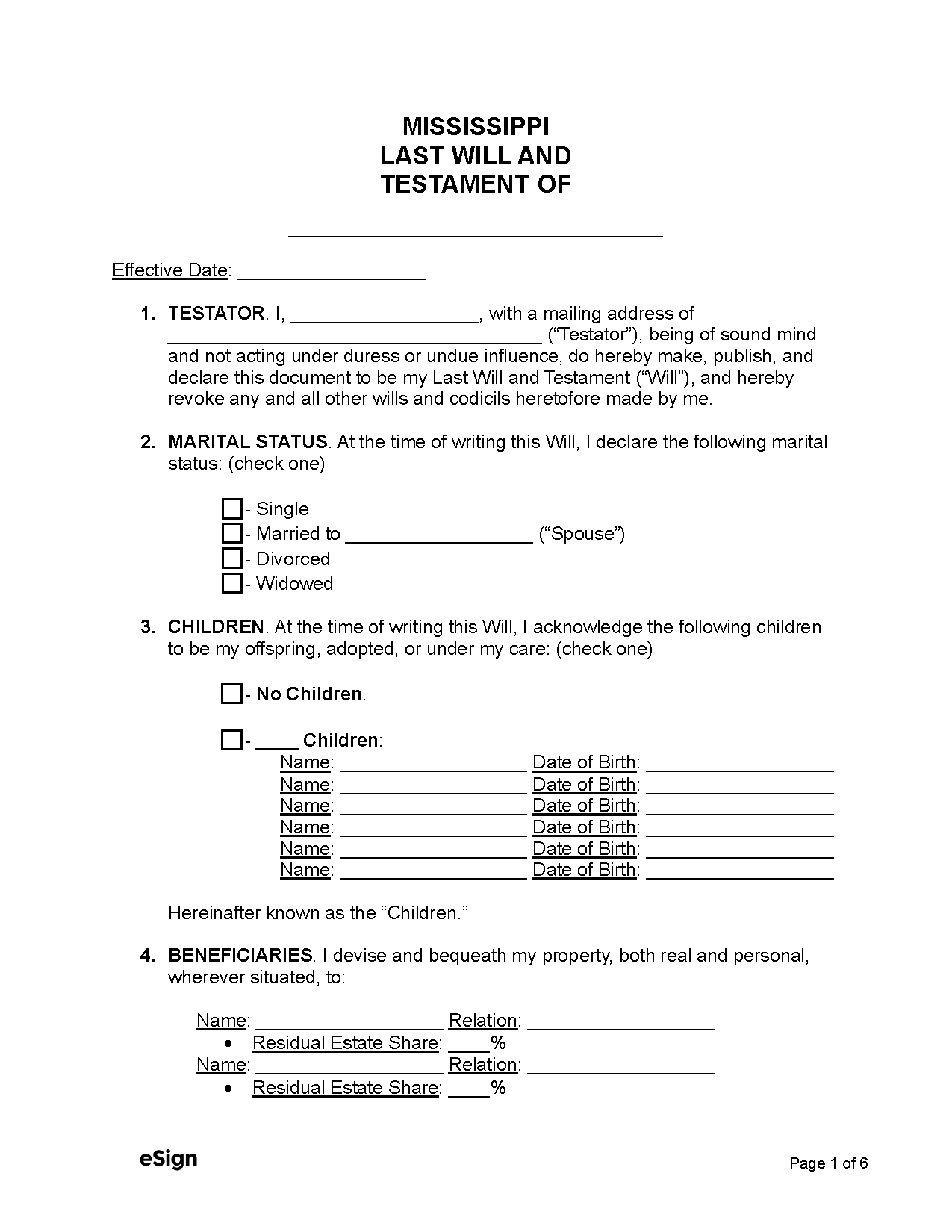State Laws
Only individuals aged 18 and older that are of sound mind may execute a will.[1]
Holographic Wills – A handwritten will needs only the signature of the testator to be considered valid.
Revocation – A will is revoked if the testator destroys the original document, executes a new will, or drafts a written statement revoking the will.[2]
Signing Requirements – A will must be signed by the testator (or a party acting under their authorization) and two credible witnesses.
Probate Process in Mississippi (7 steps)
There is no time limit to file a will in Mississippi. However, if 40 days pass after the testator’s death and no one files the will, the court may appoint someone to act as administrator and initiate the probate process.[3]
There are two types of probate in Mississippi; common form and solemn form. The below instructions detail the common form probate process, the less formal and more frequently used option.
- Hire an Attorney
- File Petition
- Letters Testamentary
- Bond (If Applicable)
- Notice to Creditors
- Inventory (If Applicable)
- Final Account (If Applicable)
- Close Estate
The following is meant to be a general overview of the probate process. It is recommended that executors/personal representatives consult with an attorney if they’re unsure of any step.
1. Hire an Attorney
2. File Petition
Estates under $75,000 can be distributed without probate using the Affidavit of Small Estate.[5]
The Petition to Admit Will to Probate must be attached to the original will and filed in the Chancery Court of the county where the decedent resided.[6] The will must be proved by the testimony of one of the witnesses or a signed affidavit attached to the will.[7] Once the filing is complete, the attorney must either attend a court hearing to obtain an order to open the estate or request the order from the judge directly.
3. Letters Testamentary
The court will grant the executor named in the will Letters Testamentary. If there is no named executor, or if none present themselves within forty days of the testator’s death, the court will appoint an administrator. The executor/administrator must be at least 18 years old, of sound mind, and without conviction of a felony.[8][9]
Furthermore, those appointed as executor/administrator must take an oath prescribed by the court after being granted Letters Testamentary.[10][11]
4. Bond (If Applicable)
The executor/administrator must provide a bond equal to the estate value unless otherwise specified in the will.[12][13] However, the court may still require a bond if they deem one necessary. If the executor fails to post bond, the court may remove them from their position and appoint a new administrator.
5. Notice to Creditors
The executor/administrator must make an effort to ascertain the creditors that have a claim against the estate. These creditors should be mailed notice of the 90-day period for making claims.
After filing an affidavit stating that creditors have been notified, a notice of the 90-day filing period must also be published in the local newspaper for three consecutive weeks.[14] Proof of the newspaper publication must then be filed with the court.
6. Inventory (If Applicable)
The executor/administrator must submit an Inventory of the decedent’s estate within 90 days of being granted Letters Testamentary. The Inventory must state the market value of each item and any associated encumbrances. Filing an Inventory is not required if waived in the will by the testator, though it may be required at the court’s discretion.[15]
7. Final Account (If Applicable)
Unless waived in the will, the executor must file with the court a Final Account of the estate value, including current balances, settled debts, and all other transactions.[16] A list of the estate’s beneficiaries and their addresses must be filed with the Final Account and should specify if any beneficiaries are under 21, of unsound mind, or have a felony conviction.[17]
The attorney will prepare the Petition to Close Estate, which must be signed by the executor and filed with the Final Account.
8. Close Estate
The court must allow the Final Account to remain on file for a 30-day period for interested parties to view it and present any objections. The court will summon all interested parties to appear before the court and contest the Final Account, if they so wish.[18]
If no party disagrees with the Final Account or fails to demonstrate why it should not be approved, the attorney will obtain an order to distribute estate assets from the court.[19] Once the executor/administrator carries out the orders, their attorney may file a statement of compliance to demonstrate that the will has been executed and that the estate is closed.

